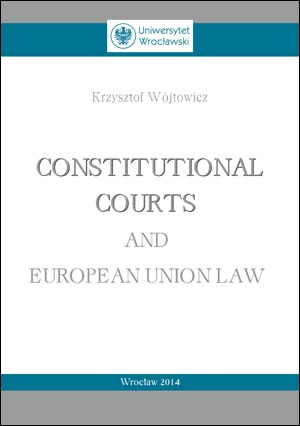Constitutional courts and European Union law
Posted śr., 2014-12-17 23:05
 The Treaties establishing the basis of the European Union are not its constitution, which would subordinate all other norms binding in the EU territory, while the Court of Justice of the European Union is not a court conclusively adjudicating on the conflicts between EU and national norms. Moreover, constitutions remain legal acts of supreme legal force in the Member States and their observance is as a rule enforced by constitutional courts. Thus a conflict is inherent in the system, but at the same time there are Treaty and constitutional provisions, thanks to which the Court of Justice of the European Union on the one hand and constitutional courts on the other can interpret and apply law to attain common objectives of the integration without undermining fundamental principles of a democratic State ruled by law. The demand supported by the doctrine that the interested courts should conduct a specific “dialogue” by all means deserves praise. Since there is no ultimate mediator, this remains the only way of resolving conflicting situations. Together with the Court of Justice of the European Union constitutional courts should actively create the European legal area. On the one hand, they determine constitutional limits of integration, which should be considered an element of forming constitutional traditions to be taken into consideration by the Court of Justice of the European Union in its case-law; on the other hand, the stance adopted by these constitutional courts which base the relations with EU law on the presumption of compliance of EU law provisions and their interpretation conducted by the CJEU with the values and principles expressed in constitutional provisions should be propagated.
The Treaties establishing the basis of the European Union are not its constitution, which would subordinate all other norms binding in the EU territory, while the Court of Justice of the European Union is not a court conclusively adjudicating on the conflicts between EU and national norms. Moreover, constitutions remain legal acts of supreme legal force in the Member States and their observance is as a rule enforced by constitutional courts. Thus a conflict is inherent in the system, but at the same time there are Treaty and constitutional provisions, thanks to which the Court of Justice of the European Union on the one hand and constitutional courts on the other can interpret and apply law to attain common objectives of the integration without undermining fundamental principles of a democratic State ruled by law. The demand supported by the doctrine that the interested courts should conduct a specific “dialogue” by all means deserves praise. Since there is no ultimate mediator, this remains the only way of resolving conflicting situations. Together with the Court of Justice of the European Union constitutional courts should actively create the European legal area. On the one hand, they determine constitutional limits of integration, which should be considered an element of forming constitutional traditions to be taken into consideration by the Court of Justice of the European Union in its case-law; on the other hand, the stance adopted by these constitutional courts which base the relations with EU law on the presumption of compliance of EU law provisions and their interpretation conducted by the CJEU with the values and principles expressed in constitutional provisions should be propagated.
*****
Tytuł: Constitutional courts and European Union law
Autor: Wójtowicz Krzysztof
Recenzja:prof. zw. dr hab. Roman Wieruszewsk
Temat i słowa kluczowe: Constitutional courts; Constitutional identity; European Union law; Primacy; Review of constitutionality; Sovereignty; autonomy of EU law; ultra vires action; supremacy of constitution; fundamental rights; preliminary reference; infringement of EU law; State's liability
Wydawca: E-Wydawnictwo. Prawnicza i Ekonomiczna Biblioteka Cyfrowa; Wydział Prawa, Administracji i Ekonomii Uniwersytetu Wrocławskiego
Identyfikator:ISBN 978-83-61370-94-9
Miejsce wydania: Wrocław
Data wydania: 2014
Prawa: © Copyright by Krzysztof Wójtowcz ; © Copyright for the English translation e-Wydawnictwo. Prawnicza i Ekonomiczna Biblioteka Cyfrowa. Wydział Prawa, Administracji i Ekonomii Uniwersytetu Wrocławskiego and Krzysztof Wójtowcz
Projekt i wykonanie okładki:Andrzej Malenda
Skład i opracowanie techniczne: Anna Lenartowicz, Tomasz Kalota - eBooki.com.pl
Dostęp online: http://www.bibliotekacyfrowa.pl/publication/54527
*****
Spis treści
Chapter I. The European Union law as an autonomous legal order
1. Sources of the European Union law
2. Autonomy of the European Union law with regard to international law
3. Autonomy of the European Union law with regard to the internal law of the Member States
1. Justification for the primacy of the European Union law
2. The effects of primacy of application of the European Union law
Chapter III. Jurisdiction of constitutional courts over the European Union law
1. Preventive review of constitutionality of the EU primary law
2. Ex post review of constitutionality of the EU primary law
3. Review of constitutionality of EU legal acts
1. The principle of supremacy of constitution
2. Absence of authorisation of the European Union for ultra vires action
Chapter V. Normative anchors of judicial protection of constitutional basis of the State
2. Responsibility of a State for the infringement of EU law by a constitutional court
